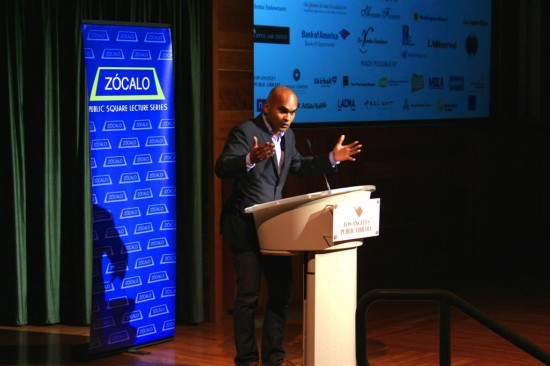
Reihan Salam is not a typical Republican. He’s not white. He doesn’t drive. He’s from Brooklyn. And he loves Los Angeles.
“I’m a really awful Republican,” he confessed to the crowd at the Los Angeles Central Library. But his black sheep status didn’t stop him from expounding on why his party is losing voters and what it can do to win them back.
The consumption compromise
Salam, an associate editor of The Atlantic and an author, began by probing what Republicans take for granted: the loyalty of the white working class. Their votes weren’t won by social conservatism alone. Instead, it was what Salam called the consumption compromise. Noting the work of University of Chicago economists, Salam said that Republicans won the working class by capitalizing on their economic optimism. Even if they were in the lower income brackets and victim to wage stagnation, the working class experienced only low inflation rates on the goods they were most likely to purchase, like groceries and apparel, while those in high income brackets experienced high inflation on items like personal services and American-made goods. High home prices, too, made lower-income homeowners “feel more prosperous than they were,” Salam said, and low gas prices let them commute ever longer distances from their dream home to their workplace. The optimism meant Republicans never had to update their 1980s-era rhetoric of lower taxes and stronger national security (even if President Bush talked up “compassionate conservatism” during his 2000 run).
 The compromise shattered when housing prices sank and food, gas, and manufactured goods prices spiked, Salam argued. That meant that the same old Democratic song – government intervention to more tightly regulate the economy – sounded sweeter to Republican ears. With no end to the recession in sight Republicans, Salam said, need a new tune.
The compromise shattered when housing prices sank and food, gas, and manufactured goods prices spiked, Salam argued. That meant that the same old Democratic song – government intervention to more tightly regulate the economy – sounded sweeter to Republican ears. With no end to the recession in sight Republicans, Salam said, need a new tune.
Boomerang kids
Salam predicted a dire future: kids living at home till the age of 40, and then moving out only to spend half their incomes to buy homes. The trend toward children living at home “is something that is very traumatic for a lot of parents,” Salam said, prompting some knowing guffaws from the back of the crowd. But parents aren’t the only ones suffering the consequences – Salam said that immobility could create “deep structural changes to the culture that will be very unpredictable.”
But that “dark future” can be avoided, Salam said, with some careful government intervention to “help preserve the middle class way of life.” To do it, Republicans need to apply language they’re accustomed to using – talk of family values – to build support for progressive healthcare, housing, and economic policies. Barack Obama did this well, Salam said, but John McCain failed to shift away from war and tax cuts.
Salam’s prescription for the party didn’t sit well with some in the audience, who asked whether his ideal GOP left room for a philosophy of limited government, or whether it required a split in the party between Christian conservatives and moderate libertarians. Another simply asked, “Why are you a Republican?”
Salam explained that the American political system makes three parties unlikely, and that the two parties will thus always be “awkward, fumbling coalitions with lots of contradictions,” making it possible for the Republicans to shift their philosophy and their message. Advocating government intervention would simply mean acknowledging openly the subsidies created by existing government policy, Salam said. He suggested, for example, implementing wage subsidies instead of a minimum wage, since a minimum wage shifts the cost of maintaining a wage floor to businesses, which might opt to hire fewer people. It’s this sort of careful attention to intervention, and a humility about its effects, that Salam said made him a Republican, along with a healthy dose of pent-up contrarianism from a lifetime among lefties in Brooklyn.
 The Sarah Palin of his dreams
The Sarah Palin of his dreams
The final question from the crowd asked Salam to name the Republicans he thought could remake the party. Unfortunately, none of his suggested candidates exist, at least not at the moment: a Mike Huckabee who has a “strong policy profile,” a Mitt Romney who never pandered to the far right, and the “Sarah Palin of [his] imagination.”
All three, Salam said, had an instinctive ability to connect with people – Huckabee with evangelicals, Palin with working men and women, and Romney with executives and Detroit autoworkers alike. Salam was once, before she became a candidate for veep, an unabashed Palin booster, though he admits that “Now I am of course eating my hat.”
Still, he said, “maybe she will be an interesting and quirky candidate. Though that would involve her actually reading the papers.”
Watch the video here.
See more photos here.
*Photos by Aaron Salcido.




Send A Letter To the Editors